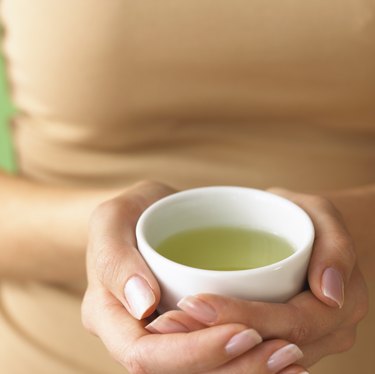
Tea may have both negative and beneficial effects on digestion. Due to its caffeine content, tea creates a diuretic effect that aids in the removal of bodily waste. However, a chemical in tea known as theophylline may have a dehydrating effect on stools passing through the intestines, resulting in worsened cases of constipation. For best results, keep your tea intake below the 300 milligrams of caffeine recommended for most adults.
Black and Green Tea
Video of the Day
Both black and green tea have been used traditionally to promote digestion, treat flatulence and reduce negative digestive symptoms such as diarrhea and vomiting. Although green tea may be slightly higher in antioxidants, both teas contain essential oils and polyphenols that may aid digestion by stimulating gastric acids.
Video of the Day
Tea and Constipation
According to a study cited by the "British Medical Journal," the theophylline compound found in tea may cause extracellular dehydration during digestion, leading to constipation. The study found that theophylline intake in excess of 100 umol. may decrease tubular reabsorption, leading to increased plasma concentrations in the intestines. In other words, by drinking excess amounts of tea, your stools may become dehydrated in the gastrointestinal tract, resulting in reduced lubrication and constipation.
Caffeine and Constipation
While moderate amounts of caffeine may seem to offer digestive benefits, excess consumption may lead to indigestion and upset stomach. As a psychoactive stimulant, caffeine mimics a fight-or-flight response in the body, elevating the number of stress hormones, such as adrenaline, in the body. When this happens, blood is removed from your stomach and digestive system, potentially causing digestive issues. Because caffeine is a diuretic, it may also leach trace amounts of potassium, an electrolyte key to maintaining steady bowel movements.
Safety Concerns
Talk to your doctor if you experience prolonged episodes of constipation that last longer than a few hours. If you are experiencing constipation due to excess tea intake, try increasing your water consumption and eating foods high in dietary fiber to encourage a natural laxative effect.
- MayoClinic.com; Caffeine: How Much Is Too Much?; March 9, 2011
- The University of Maryland Medical Center; Green Tea; Steven Ehrlich; Sept. 20, 2010
- Worldwide Health Center; Magnesium Deficiency; Jan. 19, 2006
- MedlinePlus; Black Tea; June 3, 2011
- "British Medical Journal"; Tea Consumption: A Cause of Constipation?; March 14, 1981